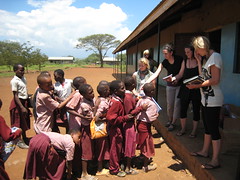“It feels too good to be true.”

We had just come across an awesome idea, and were staring at the screen in disbelief. Somebody out there was actually doing things we had been dreaming of doing. And managing to change the world for the better at the same time.
The best thing is, we actually had three “Eureka” moments like this while searching the Web. They’re all described below, ranging from the very easy to the radical and bold. Whatever their difficulty level, these designs have one thing in common. They will let you learn a language and help people who need help – all this without having to pay a penny for your lessons.
Get in, and hold on tight.

1. Freerice – easy does it
A word appears on your page. It’s got four definitions, or four translations. One of them is correct.
You think for a moment and click the definition. You’re spot on. You get a more difficult question.
Somebody gets 10 grains of rice thanks to an advertising message on the page.
Repeat.
Freerice is simple, and it might be the most addictive website for a language lover. It gives you two positive feelings: you’re making progress in your language, and you’re happy about helping end hunger. Both come in small, frequent doses.
What to learn: Languages (I’ve brushed up my German quite a lot), both vocabulary and grammar. Also maths and history of art (brilliant module with famous paintings!)
How to go about it: Use Freerice little, but often. For a feel-good dose, a 20-minute session with your morning coffee could work wonders.
Difficulty level: zero
Advanced technique: write down all the words you got wrong, and see which ones cause you trouble. Next time around, revise before playing!

2. WWOOF – helping others (and yourself) grow
This organisation has been recommended in Tim Ferriss’ “4 Hour Workweek” as one of the most economical ways to engineer your mini-retirement. I would agree that it can serve this purpose – however, it does a lot more than that.
The main idea behind the organisation’s website is to bring together wannabe travellers and people who need help with running organic farms worldwide. Once a connection is made and contact is formed, the fun part begins: you go to one of hundreds of places worldwide to help on an organic farm. It’s free travel, lots of learning, and a chance to help people who are doing a good thing!
What to learn: There are farms all around the world. There’s usually plenty of work at a WWOOF farm, but there’s also plenty of free time and play. Make sure you go to a place which offers both – and use the busy time along with the relaxed moments to pick up as much of the language as you can. Since you’ll be learning it in a situation which combines practical skills and “holiday mood,” you may just find that this is the best way for you to improve your language!
How to go about it: ask around and plan your stay carefully – for many places, reviews are available online. Book early and plan ahead – there are a few hurdles to overcome before you’re given a green light for your stay. And if you go once and love it, keep going!
Difficulty level: medium
Advanced technique: keep in touch with your WWOOF hosts. Have Skype chats, write emails, exchange news and books. Everything, of course, in the language you want to learn!

3. Voluntary teaching – teach others, learn yourself
“You went where?”
“Guyana, man.”
I didn’t even know where that was. But James had been there, and had a whale of a time. All because he decided to become a volunteer teacher.
This is a big decision, and shouldn’t be made on a whim. Once your mind is set, however, you’re in for something big and beautiful. Your work will actually make a difference to whole communities – who will surely be more than happy to teach you something about their culture. And since as a volunteer you will be very well connected with your community, your language learning cannot but benefit from that.
What to learn: Any language you want, basically. The good thing about learning that way is that you learn by immersion – not through words on the screen or a coursebook page, but by being there.
How to go about it: As was said before: think carefully before you decide. Voluntary service involves hard work, unexpected circumstances and living in an environment which might shock you if you’re used to luxuries (such as showers). Don’t just pack up and go: choose a trusted organisation and go through the entire process with them. The goal for you is to go where you’re needed, do what you’re needed to do and come back a better person.
Difficulty level: hard
Advanced technique: Once you’re there, keep a record. Start a blog, record video snapshots (if possible), keep a diary, not to mention – your own wordlist! Things will be big, new and overwhelming: being present and aware helps you to enjoy them better.
Resources and links
Freerice – a charity word game
WWOOF – Worldwide Opportunities on Organic Farms
VSO – Voluntary Service Overseas
The Humanity Exchange – Charity Work and Language Learning (new organization!)
Got any more charity- and language-related ideas? Share them in the comments!
Wiktor (Vic) Kostrzewski (MA, DELTA) is an author, translator, editor and project manage based in London. When he works, he thinks about languages, education, books, EdTech and teachers. When he doesn’t work, he probably trains for his next triathlon or drinks his next coffee.
BRAVE Learning (formerly known as 16 Kinds) is a lifelong learning and productivity blog. If you enjoy these posts, please check out one of my books and courses.
My recent publications, and my archive, is now all available on my new project: PUNK LEARNING. Hope to see you there!

One reply on “Learn a Language, Lend a Hand: How to Learn Languages Through Charity”
[…] Learn a Language, Lend a Hand: How to Learn Languages Through Charity […]